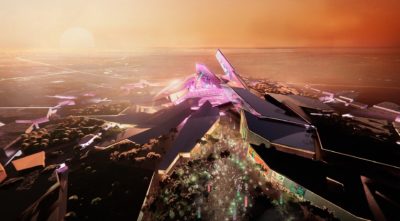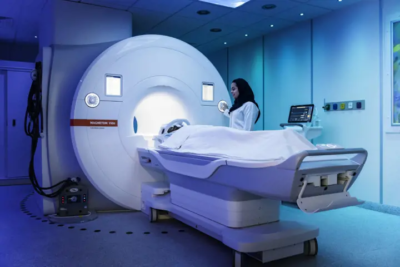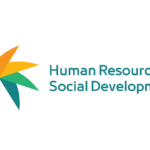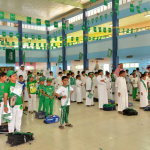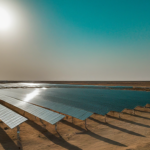
“Growth in the power sector will be led by Asia, which will see its share of demand rise to 56.7 per cent from 52.5 per cent. We highlight that China, India, and Indonesia will all see a dramatic rise in electricity demand from a combination of strong demographic and macroeconomic fundamentals as well as rapidly developing industrial activity.”
-Fitch Solutions examines future patterns of power consumption. [The National]

“Non-oil growth is a pivotal driver of this recovery; sectors such as financial services have emerged from the pandemic in a position of strength…When looking at Saudi Arabia, its large pool of domestic demand and the government’s commitment to the giga-projects is central to spurring economic recovery.”
-Consulting firm PwC said Wednesday in its latest Middle East Economy Watch. [CNBC] [Full Report]

“Overall U.S. crude production rose last week to 11.5 million barrels per day, according to latest U.S. Energy Department figures, inching closer to its peak of about 13 million bpd before the coronavirus pandemic hit last year. More than 70% of U.S. output comes from shale production.” U.S. shale oil production is closely monitored by OPEC+ as it prepares to meet today. [Reuters]

“Methane traps more than 80 times the heat that the same amount of carbon dioxide does in its first two decades in the atmosphere. But it degrades rapidly, meaning that action taken now can have an almost-immediate cooling effect on the Earth’s temperature.”
–105 world leaders on Tuesday signed onto the Global Methane Pledge, a U.S. and EU joint initiative, to cut methane emissions by 30% by 2030 at the COP26 conference in Glasgow, Scotland. [Bloomberg]

“Being able to play in different countries around the world and inspire more young people and young girls especially into golf is something that I never take for granted…I know the impact this event had with Saudi girls last year – with more than 1,000 signing up to learn to play – so it sounds like I’ll be playing in somewhere that’s really starting to fall in love with golf.”
-Lydia Ko, professional golfer, in comments confirming that she will make her debut in Saudi Arabia at next week’s Aramco Saudi Ladies International. [golfweek.com]

“I think we have come to the conclusion that dealing with Lebanon and its current government is not productive and not helpful with Hezbollah’s continuing dominance of the political scene, and with what we perceive as a continuing reluctance by this government and Lebanese political leaders in general to enact the necessary reforms, the necessary actions to push Lebanon in the direction of real change.”
-Prince Faisal bin Farhan al-Saud, Saudi Arabia’s Foreign Minister, following the expulsion of Lebanon’s envoy and the recall of Saudi’s ambassador to Lebanon. [CNBC]

“It’s like a staircase, we’re climbing a staircase. We’re fixing the system, we’re preparing the deals, we’re engaging the companies… I wouldn’t be surprised if we see $100 billion annual before 2030.”
-Khalid Al-Falih, Saudi Minister of Investment, discussing the kingdom’s goal of attracting $100 billion in annual foreign direct investment by 2030. [Reuters]

“So far [King Salman] is succeeding, but this is a delicate balancing act for a government that bases its legitimacy on Islamic law and social values. Some would like the process to move forward even faster. Yet it is worth remembering that 60 years ago even in the United States an unmarried woman could not check into a hotel alone or obtain a car loan in her own name.”
–David H. Rundell, former chief of Mission at the American Embassy in Saudi Arabia and the author of “Vision or Mirage: Saudi Arabia at the Crossroads,” regarding the significant changes in the social and economic participation of women in Saudi Arabia. [The Hill]

“It’s not about Dubai. It’s about what we need here, and I’m sorry, if you’re going to take multi-billion dollar deals in Saudi Arabia, you have to train our people.”
-Fahd Al-Rasheed, chief executive of the Royal Commission for Riyadh City, commenting on Saudi Arabia’s plan to prohibit foreign companies from signing contracts with government and state-backed institutions if their Middle East headquarters are not based in Saudi Arabia by the start of 2024. [Bloomberg]

“In Saudi Arabia already, from zero two years ago we already have 8% of the grid capacity in construction in renewables. I’m doing it so I know it. We have got nearly 6,000 MW ourselves, in solar and wind, and I expect us to be at 50% minimum before 2030. Minimum.”
–Paddy Padmanathan, ACWA Power’s CEO, on Saudi Arabia’s renewable energy goals. “All those commitments are real,” he commented. [S&P Global]
